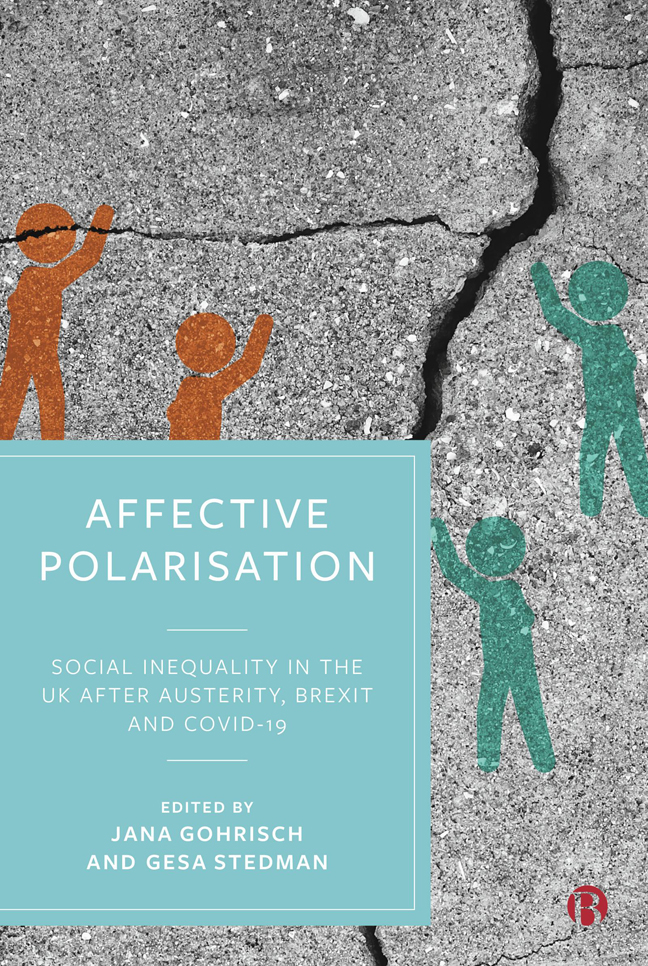Book contents
- Frontmatter
- Contents
- List of Figures, Tables and Boxes
- Notes on Contributors
- Acknowledgements
- Introduction
- 1 The Divided Left in the UK: Partisanship, Ideology and Class after Brexit
- 2 Populism and the People: Elitism, Authoritarianism and Libertarianism
- 3 ‘Coloring the Utterance with Some Kind of Perceivable Affect’: Constructing ‘Country’ and ‘People’ in Speeches by Theresa May and Boris Johnson – A Linguistic Perspective
- 4 The Challenges of Polarisation: Lessons for (Re-)Politicising Inequality across Four English Towns
- 5 “Go Away, But Don't Leave Us”: Affective Polarisation and the Precarisation of Romanian Essential Workers in the UK
- 6 Racialised Affective Polarisation in the UK
- 7 “Now You Have to Listen”: A Historical Analysis of Britain’s Left-Behind Communities
- 8 Britain in a State of Emergency: Studying Ken Loach's Films I, Daniel Blake (2016) and Sorry We Missed You (2019)
- 9 Cloaking Class: Making the Working Class Visible
- 10 Class, Poverty and Inequality in Scotland: Independence and the Creation of Affective Polarisations
- 11 Language and Identity: The Taliesin Tradition
- Conclusion
- Index
7 - “Now You Have to Listen”: A Historical Analysis of Britain’s Left-Behind Communities
Published online by Cambridge University Press: 23 January 2024
- Frontmatter
- Contents
- List of Figures, Tables and Boxes
- Notes on Contributors
- Acknowledgements
- Introduction
- 1 The Divided Left in the UK: Partisanship, Ideology and Class after Brexit
- 2 Populism and the People: Elitism, Authoritarianism and Libertarianism
- 3 ‘Coloring the Utterance with Some Kind of Perceivable Affect’: Constructing ‘Country’ and ‘People’ in Speeches by Theresa May and Boris Johnson – A Linguistic Perspective
- 4 The Challenges of Polarisation: Lessons for (Re-)Politicising Inequality across Four English Towns
- 5 “Go Away, But Don't Leave Us”: Affective Polarisation and the Precarisation of Romanian Essential Workers in the UK
- 6 Racialised Affective Polarisation in the UK
- 7 “Now You Have to Listen”: A Historical Analysis of Britain’s Left-Behind Communities
- 8 Britain in a State of Emergency: Studying Ken Loach's Films I, Daniel Blake (2016) and Sorry We Missed You (2019)
- 9 Cloaking Class: Making the Working Class Visible
- 10 Class, Poverty and Inequality in Scotland: Independence and the Creation of Affective Polarisations
- 11 Language and Identity: The Taliesin Tradition
- Conclusion
- Index
Summary
Introduction
This chapter proposes that affective polarisation, as outlined throughout this volume, is fundamentally steeped in historicity. The crises and tribulations that have destabilised Britain's long-standing political systems and traditions in the early 21st century are broadly consequences of sweeping transformations that have disproportionately impacted upon specific demographics and regions. Indeed, since Britain's voters took the unprecedented and seismic decision to leave the EU in 2016, there has been significant academic interest in the Eurosceptic demographic of ‘older, white, socially conservative voters in economically marginal neighbourhoods’ that Ford and Goodwin have termed the ‘left-behind’ (2014a, pp 151–9). They recognised these voters as being ‘on the wrong side of social change … and feeling threatened by the way their communities and country are changing’ (Ford and Goodwin, 2014b, np). The left behind saw the referendum as an opportunity to rally against a ‘political class’, perceived to be ‘dominated by socially liberal university graduates with values fundamentally opposed to theirs’ (Ford, 2016, np). The left behind are characterised as a collective of unskilled workers surviving on stagnant incomes in towns where globalisation has extenuated inequality (O’Rourke, 2018, pp 175–83). These voters are now furious at the ‘establishment in London’ for allowing their communities and country to decay (Ainsley, 2018, pp 139–51). More nuanced analysis has also enriched our understanding of left-behind values and culture. By correlating support for Brexit with personal principles, Kaufmann found that the referendum is best understood as a dichotomous choice between ‘order’ and ‘openness’, with Leave voters proving overwhelmingly in favour of measures such as surveillance and capital punishment (2020, np). Kaufmann's study found that left-behind voters opposed ‘modern liberal’ values including forgiveness and diversity, and voiced ‘a feeling that they don't belong to the present’ (2020, np). This formative analysis is undoubtedly insightful, and collectively provides a definitive impression of an elusive, reticent demographic – but is steeped in contemporaneity, with only partial consideration given to the historical changes that have facilitated the formation of the left-behind voting bloc. These ‘top-down’ examinations pay inadequate attention to the gradual, subtle transformations that have influenced disenfranchised voters; after all, the left behind were once the ‘lagging behind’, and, before then, the ‘keeping up’.
- Type
- Chapter
- Information
- Affective PolarisationSocial Inequality in the UK after Austerity, Brexit and COVID-19, pp. 142 - 168Publisher: Bristol University PressPrint publication year: 2023



